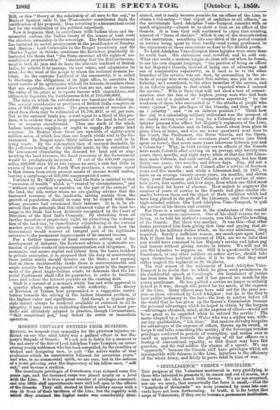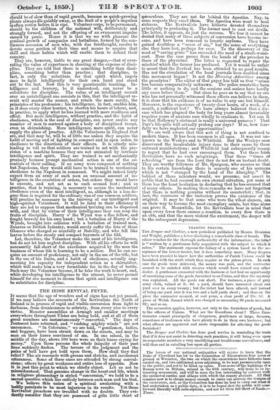" INTELLIGENCE " VERSUS " DISCIPLINE."
Tse progress of the Volunteer movement is very gratifying to those who laboured to promote it, in season and. out of season,. at, a time when the idea. found little favour. We are not surprises, nor are we sorry, that numerically the force is- small,—that the " hundreds of thousands," we were promised. by some late con- verts have not been forthcoming. In truth, it is far better that corps of Volunteers, if they are to become a permanent institution,
should be of slow than of rapid growth, because as quick-growing phints always die pinkly away, so the fruit of a people's impulses is often rotten before it is ripe. Volunteer to be permanent,. should be the children of the- national will; deliberately and strongly formed, and not the offspring of an evanescent impulse caused by panic. Hence it is that we see with _pleasure the gradual growth of companies- and battalions, formed by the con- balms accession of men who, with due forethought, resolve to devote some portion of their tine and means to acquire that skill and those habits which will' enable them to defend their cannily.
They are, however, liable to one great danger,—that of over- rating the value of expertness in shooting at the expense of disci- pllne. They are-told that there is something better than
something better than. practice ; that discipline, in fact, is only the ' substitute for that spirit which- impels men to fight intelligently for their own hand. and stand Out :to the last. Now this is very questionable teaching. rn- talligence and bravery, be it understood, can never be a substitute for discipline. The value of an intelligent recruit over an unintelligent one consists in this, that the intelligent re- cruit will master the sooner, and retain the more surely, the principles of his profession.; his intelligence, in fact, enables him, as it does every other-learner, to shorten his hours of labour, and, in- practice, to apply what he has learned with more readiness and effect: But mere intelligence, without practice, and the habit of obedience, which is the soul of discipline, can never enable any number of men to contend. against a body of disciplined troops, even in skirmishing. Mere intelligence, mere spirit, can never supply the place of practice. All the Volunteers in England that are, and that may be, will be of little use unless they acquire the habit of moving and of fighting in compact and in open order, in obedience to the directions of their officers. It is utterly mis- leading to tell us that soldiers are trained to act with the pre- cision of a machine because they are not animated by intrinsic intelligence and spirit. They are trained to act mechanically precisely because prompt mechanical action is one of the es- sentials of their calling. If an army were composed of nothing but Napoleons, they would. still have to be trained to mechanical obedience to the Napoleon in command. We might indeed fairly expect from an army of such men an unusual amount of in-
te in the execution of orders, but orders they would have ta execute, and not act as to each seemed. best ; and as practice, that is training, is necessary to secure the mechanical obedience even of the most intelligent, so, although in a less de- gree than is required for the ordinary run of our common. soldiers, will practice be necessary to the training of our intelligent and high-spirited Volunteers. It will be fatal to their efficiency if they are led to suppose that mechanical training can be dispensed with, and that by virtue of their intelligence they can reap the fruits of discipline. Harry o' the Wynd was a fine fellow, and fought bravely for his own hand ; but a battalion of Harry o' the Wynds, brought into collision with a battalion of trained. men,. Zouaves or British Infantry, would. surely suffer the fate of those ehazees who charged. so manfnlly at Bareilly, and who fell like leaves before the steady and compact bayonets of the 42d.
Let,, therefore, the Volunteer make the most of his intelligence, but do.not let him neglect discipline. With all his efforts he will necessarily fall short of the excellence acquired by the man the business of whose life is learning to be a soldier. But he can ac- 9nire an amount of proficiency,. not only in the use of the rifle, but in the use of his limbs, and a habit of obedience, actually aug- menting his capacity for independent action as a skirmisher, which- will make him a very formidable foe in the day of battle. Such may the Volunteer-become, if he take the work to heart, and, while developing- his intelligence to the utmost, he never permit himself for one moment to dream that spirit and intelligence can be substitutes for discipline..



























 Previous page
Previous page